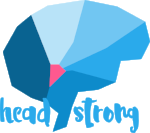Welcome to Headstrong: a place to share my 20-year-old life with post-concussion syndrome (PCS). Here you'll find my stories, life hacks, and answers to (most) of your burning questions.

Welcome to Headstrong: a place to share my 20-year-old life with post-concussion syndrome (PCS). Here you'll find my stories, life hacks, and answers to (most) of your burning questions.

Currently there is no way to diagnose chronic traumatic encephalopathy (CTE) during life, as diagnostic criteria requires the study of brain sections post-mortem. Currently Dr. Stern and his colleagues at Boston University School of Medicine are working on research to diagnose CTE during life and studying pathologies, biomarkers, genetics, and trauma history. Recently, Stern et al. have proposed research criteria involving an in vivo diagnosis of ‘traumatic encephalopathy syndrome’ (TES), which is the clinical presentation of CTE. They have also determined two possible clinical subtypes of CTE: behavior/mood and cognitive. In a study of 36 male adults all of whom had neuropathologically confirmed CTE diagnosed by the Boston University Center for the Study of Traumatic Encephalopathy Brain Bank. From these case studies, two distinct subgroups of clinical presentation became evident. One group initially presented with behavioral symptoms such as explosively, violence, or impulsivity, and the other group first presented with cognitive symptoms such as memory impairment or lack of focus.
Below I’ve included current studies taking place at, through, or in partnership with the BU CTE Center.
The study is working to develop diagnostic criteria for CTE via in vivo biomarkers and clinical diagnostic criteria.
The study is still enrolling male participants between the ages of 45-74 from three groups:
Former NFL players who played three or more seasons in the NFL;
Former college football players who played three or more seasons of varsity football at the college level and who never played organized contact sports beyond college;
Healthy controls who have no history of participation in organized contact sports, who are not diagnosed with brain disorders including dementia and depression, and who do not have significant problems with memory, thinking, mood, or behavior.
Participation includes a three day visit to a study site in either Scottsdale, AZ, Las Vegas, NV, Boston, MA or New York, NY. All food, travel, and lodging will be paid for by the study, and in addition you may be compensated up to $500 for the three day visit.
To learn more or see if you’re eligible, click here.
The study is intended to examine the effects of repetitive head impacts in living people and track their progress over time.
Participation includes online questionnaires and annual phone interviews.
Eligibility for the study will be determined based on a short screening process, which takes place over the phone.
For more information click here.
The study is determining ways to diagnose CTE during life via tests like MRI scans, MRS scans, or blood tests.
Participants undergo different neurological, psychiatric, cognitive, and genetic testing.
For more information about the study click here.
Please note that the DETECT Study is no longer enrolling. It was completed in 2015, but numerous scientific articles have been and continue to be published based on the results of this study.
The BU CTE Center co-manages the VA-BU-CLF brain bank in partnership with the Veterans Association and the Concussion Legacy Foundation. It is the largest brain bank focused on brain injury and CTE. The brain bank collects central nervous system tissue samples (like the brain and spinal cord) to study the effects of mild traumatic brain injury and CTE.
The VA-BU-CLF research team is focused on:
Developing a diagnostic test for CTE in living persons;
Identifying and understanding genetic risk factors of CTE;
Identifying and understanding environmental risk factors of CTE;
Understanding the importance of age at first exposure in the development of CTE;
Understanding the role of length of playing career in the development of CTE;
Identifying effective treatments for CTE.
Even if you are ineligible or not interested in participating in clinical research, consider pledging your brain to be studied post-mortem.
Because of my work with the Concussion Legacy Foundation (CLF), I knew that I wanted to pledge my brain as soon as I could (age 18) in the hopes of aiding research and getting answers for future athletes. Hundreds of other people, including famous athletes like Brandi Chastain and Dale Earnhardt Jr., have pledged as well. Click here to read about my decision to pledge my brain at age 18 and here to learn more about brain donation.